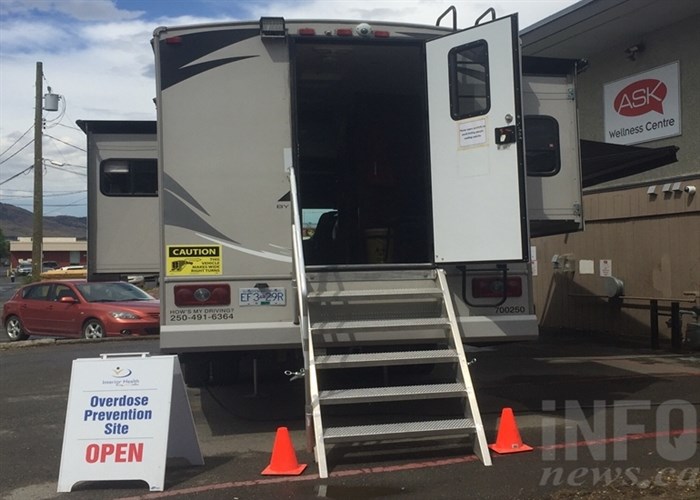
FILE PHOTO - ASK Wellness RV parked behind their Tranquille Road location.
(MIKE MCDONALD - REPORTER / iNFOnews.ca)
December 18, 2020 - 6:30 AM
ASK Wellness Society staff are burning out and the non-profit group's executive director says it’s time for the federal government to take a nationwide approach to the overdose crisis because what it is doing now isn't working.
ASK Wellness employs more than 250 people in Kamloops, Penticton and Merritt, and provides street outreach services, supportive housing, affordable housing, employment services and has a partnership with Interior Health for a supportive recovery program.
On Tuesday, Dec. 15, Kamloops city council agreed to urge the federal government to create a nationwide overdose plan and examine ways to reduce drug-related deaths and stigmas, like the legal regulation of illicit drugs to ensure the safe supply of pharmaceutical alternatives to toxic street drugs and decriminalization for personal use. It also encourage other B.C. municipalities to do the same.
“We’ve been on the frontline of the public health emergency, the opioid overdose crisis, since it began and so to have the city councillors (acknowledge the problem) … it gives us a sense of hope and we have allies in this seemingly unrelenting crisis that we’re having,” ASK Wellness executive director Bob Hughes said. “You have two public health emergencies... and it’s high time that this, on a federal level, is declared as a national emergency and resources are actually put towards managing this."
READ MORE: Kamloops council to urge feds to adopt national overdose plan
In October 2020, there were 162 suspected illicit drug toxicity deaths in B.C. This represents a 116% increase over the number of deaths seen last October (75) and a 26% increase over the number of deaths seen in September 2020 (129), according to the latest report from the B.C. Coroners Service on illicit drug deaths. In the Thompson Cariboo region, 83 deaths have been reported in 2020, more than a 50% increase compared to 2019, which recorded 40 deaths related to illicit drug use.
“Obviously, what we’ve been doing has been saving (thousands) of people’s lives just with the use of naloxone and supervised consumption sites, (but) we need to expand our vision of what we can do to have meaningful change for people,” Hughes said.
With five people dying every day in B.C. from overdoses, Hughes said the province is likely going exceed the number of fatalities ever recorded, “so I think it’s time to put the resources that we’ve seen has been effective with COVID into this addictions crisis that we’re facing and increasingly other provinces are experiencing."
READ MORE: Five people dying every day from toxic illicit drugs in B.C.: Coroner
There needs to more preventative measures taken and investments in treatments from both science and social programming, Hughes said.
“Our staff are beaten up,” he said, adding that it’s the same experience with emergency responders.
“They go home at night and experience the vicarious trauma of watching somebody needing to be, over and over, injected with naloxone to save their life. That’s no way to function on an ongoing basis. We need to envision more than just putting bandages on people and look at doing a systems overhaul.”
The drug supply is so contaminated and increasingly so with benzodiazepine, that it nullifies the ability to use naloxone which is the life-saving tool for people on drugs, Hughes said.
Interior Health issued a contaminated drug alert for Kamloops and the South Okanagan this week, warning heroin users to be wary of buying a purple chunky substance that contains benzodiazepines and fentanyl.
READ MORE: Interior Health issues alert for contaminated drug supply in Kamloops
“We have to decriminalize and rely on a safer supply of substances. As provocative as it is to say, bring back pure heroin, frankly. This is the problem, there’s no pure heroin on the streets, what we hear and see and you check in with detox facilities, they’ll say the drug of choice is not heroin, it’s fentanyl. We need to come up with a new approach to our supply of drugs,” Hughes said.
In Kamloops, there isn’t a robust treatment system, there need to be ways to look at preventing people from falling into the traps of addictions, and to implore them to access treatment and stay in a form of recovery, Hughes said. There are currently limited resources to address this in the community and across the province, he said.
In July 2020, the B.C. government announced $13.5 million to add an estimated 50 to 70 new publicly funded treatment and recovery beds for adults throughout the province.
To contact a reporter for this story, email Carli Berry or call 250-864-7494 or email the editor. You can also submit photos, videos or news tips to the newsroom and be entered to win a monthly prize draw.
We welcome your comments and opinions on our stories but play nice. We won't censor or delete comments unless they contain off-topic statements or links, unnecessary vulgarity, false facts, spam or obviously fake profiles. If you have any concerns about what you see in comments, email the editor in the link above.
News from © iNFOnews, 2020